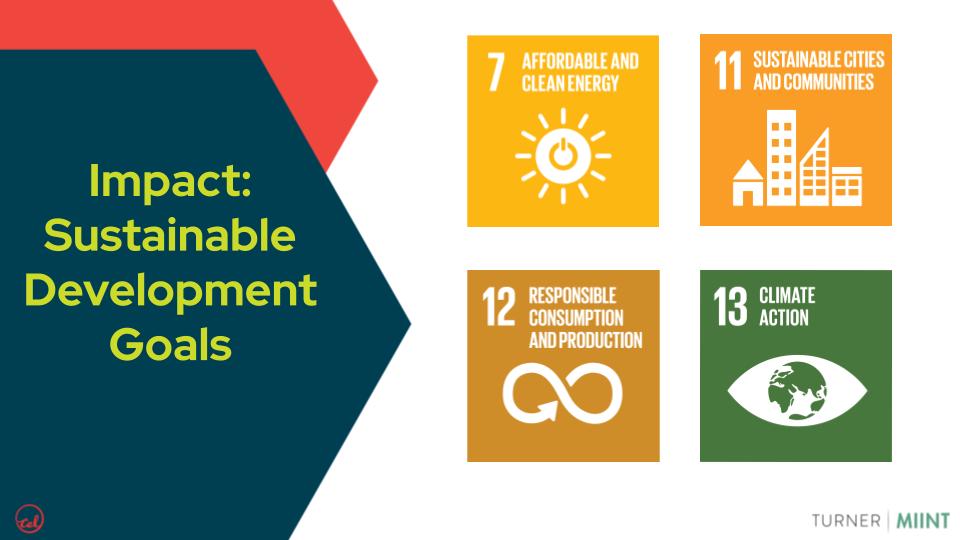Written By:
Carly Joos ‘22
Digital Content Editor
Connect with Carly on LinkedIn
Devon Maddux ‘22
Contributing Writer
Connect with Devon on LinkedIn
It was a crisp October afternoon when our team first met. The whiteboard in our meeting room mapped out the UN’s Sustainable Development Goals, pulling together themes and ideas on which we could base our investment thesis. One kept catching our attention – “Affordable and Clean Energy.” The energy experts on the team, Ben Foxman and Josh Kriesberg, chimed in with energy-burden metrics while we discussed the realities of climate justice. Quickly, our thesis became clear, “our firm will invest in companies at the nexus of clean technology and accessibility.” We unofficially dubbed ourselves Empathic Ventures and embarked on our journey through the Turner MIINT competition.

Every year the University of Pennsylvania’s Wharton School of Business pairs up with the Bridges Impact Foundation to host the Turner MBA Impact Investing Network & Training (MIINT) program. This year-long competition is designed to give MBA students a hands-on experience as early-stage impact investors. During the 2021-2022 academic year, 630 students competed from 45 global institutions. The grand prize? A $50,000 investment into an impact-driven startup of the team’s choosing. Along the way, each team was required to develop an investment thesis, source potential investments, conduct due diligence, and ultimately craft an investment memo and pitch their chosen startup.
This was the second year that students from the University of Vermont’s (UVM) Sustainable Innovation MBA (SI-MBA) program participated in the competition. Two teams competed internally to make it to the semi-finals – our team versus another whose investment thesis focused on women’s healthcare. We felt honored to be chosen to represent UVM in the semi-finals and, ultimately, our team was one of eight that made it to the final competition. We competed in the finals alongside other top business programs including the London School of Economics, MIT Sloan School of Management, the Wharton School, UNC Kenan-Flagler Business School, Columbia SIPA, Harvard Business School, and the Yale School of Management.
In addition to a competition, the Turner MIINT program offers an incredible opportunity to learn the ins and outs of impact investing and venture capital. The program provided a host of resources and asynchronous learning modules that guided our team through the full investment cycle. We attended workshops with industry experts who shared frameworks for analyzing both business performance and social and environmental impact. Participating in this challenge, we were both humbled and inspired by the global scale at which the sustainable revolution is washing over the private equity and venture capital industry. Students from all over the globe were able to have the shared experience of learning what it means to be an impact investor.
Alongside guidance from the Turner MIINT competition facilitators and partners, the SI-MBA program paired us with faculty advisor Cairn Cross. Cairn is the Co-founder and Managing Director of Fresh Tracks Capital, an early-stage venture capital firm focused on financing businesses in Vermont. Cairn was very generous with his time, scheduling frequent check-ins to help our team understand core topics in venture capital. These topics included: developing an investment thesis, sourcing potential deals, analyzing startup pro-forma financial statements, and more. Cairn also brought in experts from his network to help us through the due diligence process, provide feedback and support, and ultimately judge our investment memo and pitch. These sessions, along with the work required to advance through the competition, often required hours of work each week in addition to our accelerated MBA curriculum. Nevertheless, our team thrived knowing that we could provide catalytic capital to help a potentially world-changing company get its start.

After a rigorous sourcing and due diligence process where we explored over 20 different early-stage ventures, we ultimately recommended investment in Community Energy Labs (CEL). CEL is a woman-founded, woman-run company with a mission to make smart energy management and decarbonization accessible and affordable. The company’s commercial building control solution uses machine learning to monitor, learn, and adjust building energy use to meet client goals. CEL is focused on bringing their affordable solution to schools, universities, and municipalities to help buildings lower energy costs, reduce CO2 emissions, and ultimately prepare for a transition to renewable energy sources. Although our team did not have the opportunity to invest in CEL, we continue to stay close to the company’s founder, Tanya Barham, and are excited to continue supporting its mission as we advance into our post-MBA careers.
“MIINT opened my eyes to the sustainable change and positive non-financial outcomes created through impact investment,” Tate Moeller reflected about her experience in the program. “In 2021, just 2% of venture capital funds were awarded to female-founded companies. Pitching a woman-owned and led, energy and tech-focused startup in the finals of Wharton’s global competition was one of my proudest accomplishments this year. I am very grateful to have shared it with wonderful classmates and friends.”
Overall, the Turner MIINT competition provided an incredible experience that left our team with a great network, new skills, and, most importantly, lifelong friendships. In addition to the personal growth we gained through this program, we are humbled to be part of the larger industry shift toward impact investing. We hope to support the increasing momentum that impact investing has in securing a more sustainable future for business. Ultimately, it will be the disruptive entrepreneurs of today that pave the way for the sustainable businesses of tomorrow.
